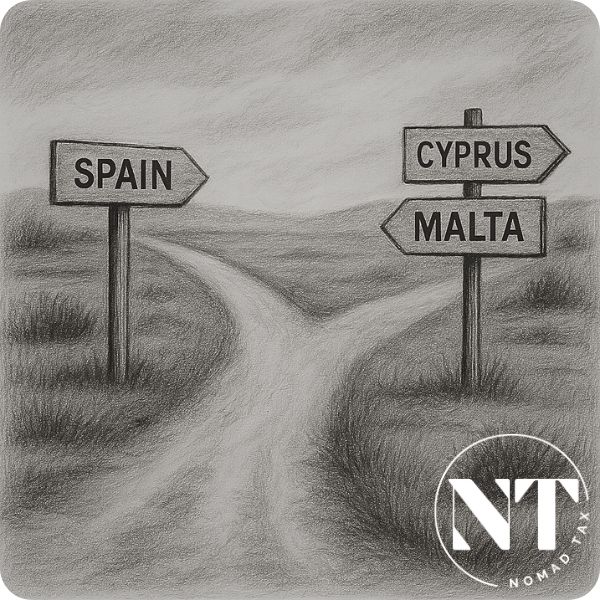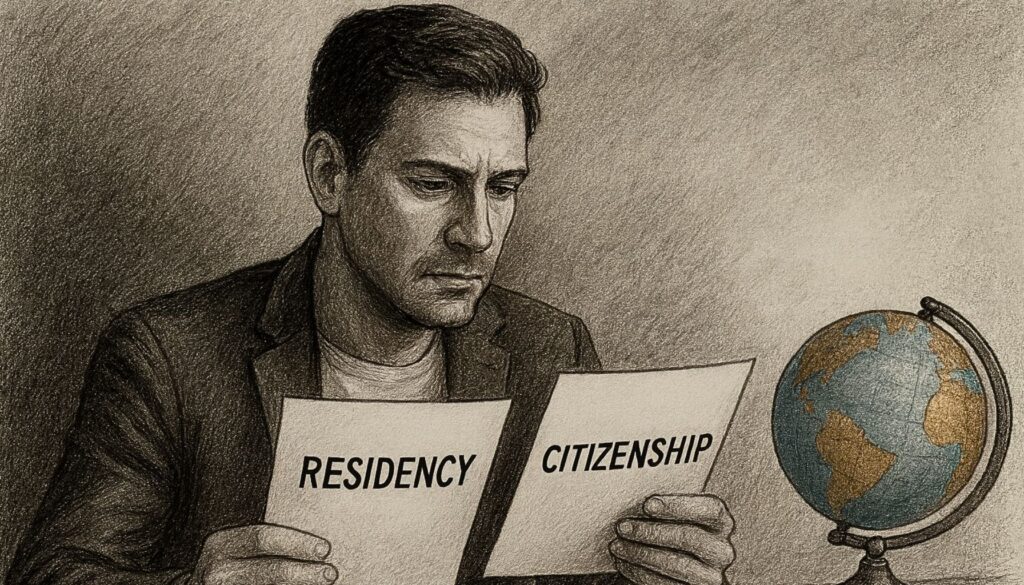The Spanish passport is one of the most desired documents in Europe. It promises freedom, quick integration, and the feeling of holding the key that opens every door on the continent. For thousands of Latin Americans, it sounds like the perfect shortcut: same language, shared cultural roots, and the chance to belong without starting from scratch.
But behind that promise lies a trap that few calculate in time: the hidden tax cost of obtaining The Spanish passport. What looks like a fast track to European freedom can become the most expensive bill of your life, with taxes hitting even before you hold the document in your hand.
In this blog, we will analyze how the process of obtaining The Spanish passport in 2025 really works, what the most common tax risks are, the limitations of the famous Beckham Law, and which smarter alternatives exist in Europe. We will also look at cases where this passport can be a useful shortcut—and others where it turns into a golden trap that compromises your wealth.

Indice del artículo
The appeal of The Spanish passport in 2025
What truly makes it a magnet for thousands of Latin Americans is not the language or cultural closeness, but the reduced timelines and accessible requirements that set it apart from the rest of Europe.
Reduced legal residency time for Ibero-Americans
In most European countries, you need a decade to apply for nationality. Spain breaks that pattern:
- 2 years for citizens of Ibero-America, Andorra, the Philippines, Equatorial Guinea, or Portugal.
- 1 year if you are married to a Spanish citizen.
Basic requirements to access The Spanish passport
In addition to the residency period, applicants must:
- Pass the CCSE exam (constitutional and sociocultural knowledge).
- Certify DELE A2 if you are not a Spanish speaker.
- Maintain legal and continuous residence during the required timeframe.
A concrete reward: The Spanish passport opens the door to all 27 EU countries and allows visa-free travel to almost 190 destinations worldwide.
Hidden tax cost of obtaining The Spanish passport
Nomad, behind the appeal of The Spanish passport lies a bill that almost no one calculates before making the move. The most common mistake is to think only about the migration benefits and forget that by residing in Spain you step directly into one of the most aggressive tax systems in Europe.
Personal Income Tax (IRPF) and worldwide taxation
Becoming a tax resident in Spain means that the tax authority will charge you not only for what you generate inside the country, but also for your income anywhere in the world. The maximum rate can reach up to 50%. A high salary, income from a foreign company, or even simple international investments immediately become a fiscal target.
Wealth Tax and Inheritance
Spain is one of the few European countries that still maintains a wealth tax. If you arrive with one million euros, the bill can reach around €35,000 annually just to keep it. And for inheritances, the cost ranges from 7.65% to 34%, depending on the autonomous community.
Modelo 720: obligation to declare assets abroad
In addition, every tax resident in Spain must file the well-known Modelo 720: an informative declaration of accounts, real estate, and investments held abroad. The problem is not only the bureaucracy but also the penalties in case of errors or omissions. This obligation turns your global wealth into an open map for the Spanish tax authority.
In short, what begins as a “shortcut” can turn into a tax burden that devours your wealth. This is the perfect prelude to understanding why the famous Beckham Law is presented as a lifeline—even though in reality it often proves to be a mirage.

The Beckham Law: advantages and traps in The Spanish passport
When people discover the real costs of obtaining The Spanish passport, many turn to the famous Beckham Law as a supposed solution. This special regime, originally designed to attract sports talent and high-profile executives, allows taxation as a non-resident for six years: a fixed 24% on income earned in Spain, without declaring foreign income or paying Wealth Tax on assets abroad.
At first glance it looks perfect, but the limitations are clear:
- It does not apply to freelancers, digital nomads, or those who own more than 25% of their company.
- It does not cover international income—only what is earned in Spain.
- Its duration is short: by the seventh year you fall under the ordinary regime with its full fiscal arsenal.
In other words, the Beckham Law is not a real refuge for entrepreneurs or international investors.
Spain under international scrutiny: the lawsuit against Hacienda
But the problem goes beyond the fine print of the Beckham Law. In 2025, international lawyer Robert Amsterdam filed a lawsuit against the Spanish Tax Agency, accusing it of authoritarian and disproportionate practices: retroactivity, arbitrary reinterpretation of rules, and the use of the concept of “fiscal simulation” as a weapon to persecute taxpayers.
The case of a businessman who moved his residency to obtain The Spanish passport illustrates it: despite structuring his wealth through legal international companies, years later Hacienda rewrote the rules and accused him of “simulation,” imposing multi-million euro penalties. A brutal reminder that in Spain, legal certainty can be as fragile as paper.

Alternatives to The Spanish passport for achieving mobility in Europe
Malta
More expensive, but designed for those who prioritize legal security and stability. Malta offers a clear path to European mobility without falling into the Spanish tax trap.
- Residency and citizenship by investment.
- Programs with high disbursement but efficient in tax terms.
- Strong European passport with double taxation treaties.
Cyprus
The strategic option for digital nomads and entrepreneurs seeking flexibility. Cyprus combines attractive tax rules with accessible residency.
- Tax residency possible with only 60 days of annual presence.
- Non-Dom regime: 17 years of exemption on dividends, interest, and capital gains.
- Flexibility and benefits within the EU without chaining mobility.
In addition, Cyprus offers a path to citizenship: after seven years of residence within a ten-year period—provided the last year is continuous—you can apply for naturalization. There is even a fast-track option of three years for highly qualified profiles with fluency in Greek.
Is The Spanish passport worth it in 2025?
The debate has no single answer. The Spanish passport is undoubtedly one of the most attractive keys to enter Europe, but what for some is a shortcut to new opportunities, for others may turn into a tax trap that erodes wealth and freedom. The key lies in each applicant’s profile and the strategy behind it.
Young people without wealth: when it can be a shortcut
For students, professionals in training, or people without significant income or assets, The Spanish passport can be a smart move. Two years of legal residence are enough to access citizenship, with shared language, cultural ties, and direct access to the European market. In this scenario, the tax costs are low and manageable, and the benefits far outweigh the burdens.
Risks of obtaining The Spanish passport as an entrepreneur
The scenario changes radically for entrepreneurs, digital nomads, and investors. Spain taxes global income with a personal income tax that can reach 50%, maintains a wealth tax unique in Europe, and obliges residents to declare foreign assets. Thus, what begins as a process to obtain The Spanish passport may end in a disproportionate annual bill and a climate of legal uncertainty that undermines confidence in the system.
Tax strategy before applying for The Spanish passport
This is where the difference between losing and winning lies. Before applying for The Spanish passport, it is essential to design a clear tax plan:
- Define where your company and your investments will reside.
- Evaluate more efficient European alternatives, such as Malta or Cyprus.
- Protect your wealth through international legal structures.
The passport should not be seen as an end in itself but as a tool. Used without strategy, it can become the most expensive document of your life; planned correctly, it can be the key to global mobility and new opportunities.

Conclusion: The Spanish passport and the importance of planning your strategy
The Spanish passport symbolizes access, belonging, and an apparent European freedom. But in 2025, what really defines its value is the hidden price paid in taxes, in shifting rules, and in a climate of legal uncertainty that not everyone is willing to bear.
The decision, then, is not just “should I obtain it or not,” but how it fits within a broader fiscal and wealth architecture. For some, it will be a mobility tool with manageable costs; for others, it will be the gateway to a fiscal maze that only international planning can solve.
At Nomad Tax we say it clearly: documents open borders, but it is strategy that protects your freedom.
Book your consultation with Nomad Tax today and design a plan that turns opportunities into results, not into burdens.



